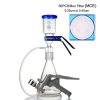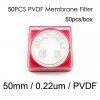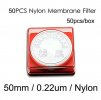I've seen a few different ways of filtering oils once they are heated and mixed well, but I wanted to know what most guys from the community feel are the best 'filter paper membranes' to use while doing the last couple of steps for vial preparation, from their own experiences.
Here are the common filters that I've heard of so far, which any could be used during the filtration process:
- MCE (Mixed Cellulose Esters)
- Cellulose acetate (CA) membranes
- Cellulose nitrate (CN) membranes
- Nylon membranes
- Polyethersulfone (PES) membranes
- Regenerated cellulose (RC) membranes
- Polytetrafluorethylene (PTFE) membranes
- Polyvinylidene Fluoride (PVDF) membranes
- Glass fiber filters
- Syringe Filtering (.2 or .22 micron paper filter)
I will be using a filtration system as shown below, but wanted to know which filter type would be BEST to use with it:

Which type of filter paper membranes do you use, and why do you feel that the one you use is best. What have your experiences been like, with your current filtration system?
Don't forget to cast your vote above on the filter paper that you use, and respond here in more details. Thank you community participating.
Polls like these will help us all when it comes time to go shopping for our lab tools since it helps to hone in on the details of each required tool.
Here are the common filters that I've heard of so far, which any could be used during the filtration process:
- MCE (Mixed Cellulose Esters)
- Cellulose acetate (CA) membranes
- Cellulose nitrate (CN) membranes
- Nylon membranes
- Polyethersulfone (PES) membranes
- Regenerated cellulose (RC) membranes
- Polytetrafluorethylene (PTFE) membranes
- Polyvinylidene Fluoride (PVDF) membranes
- Glass fiber filters
- Syringe Filtering (.2 or .22 micron paper filter)
I will be using a filtration system as shown below, but wanted to know which filter type would be BEST to use with it:

Which type of filter paper membranes do you use, and why do you feel that the one you use is best. What have your experiences been like, with your current filtration system?
Don't forget to cast your vote above on the filter paper that you use, and respond here in more details. Thank you community participating.
Polls like these will help us all when it comes time to go shopping for our lab tools since it helps to hone in on the details of each required tool.






